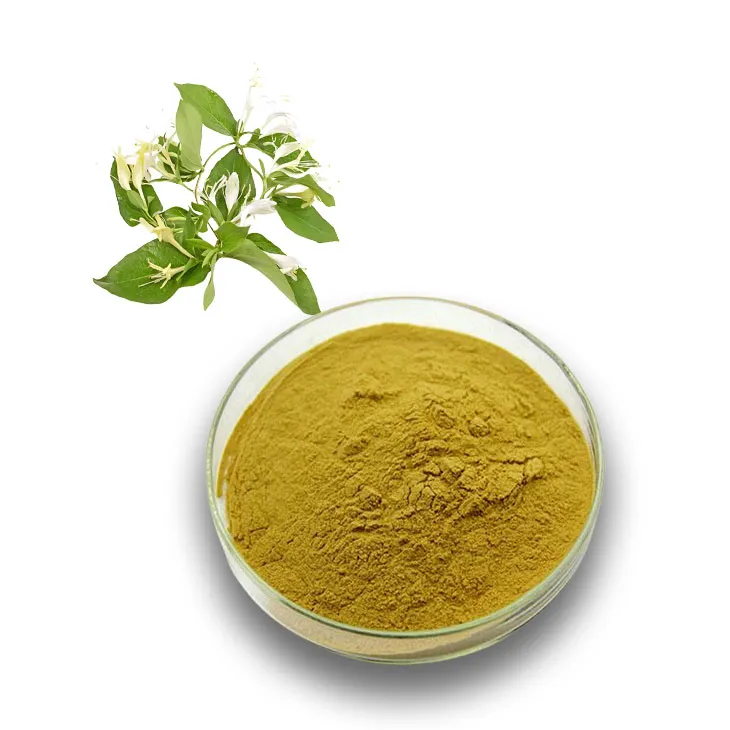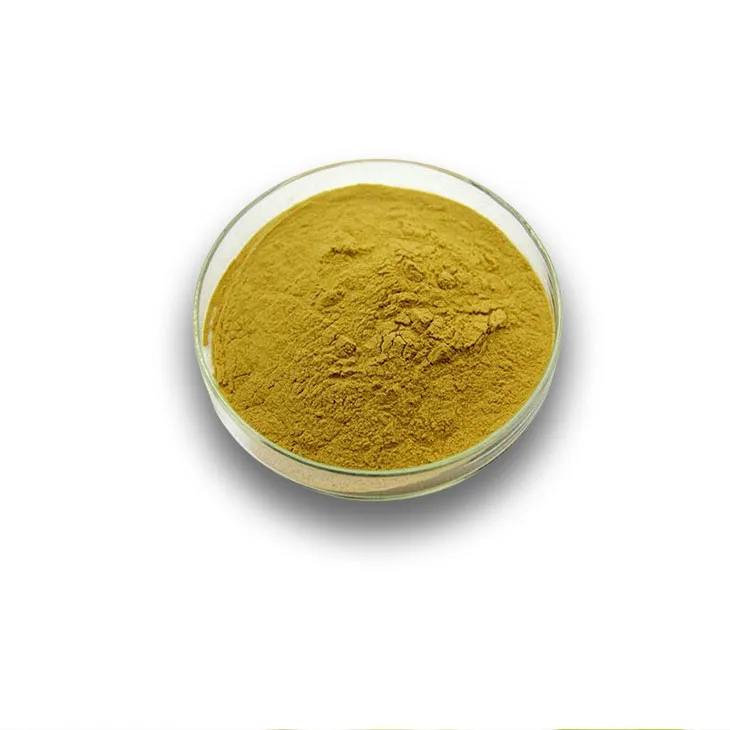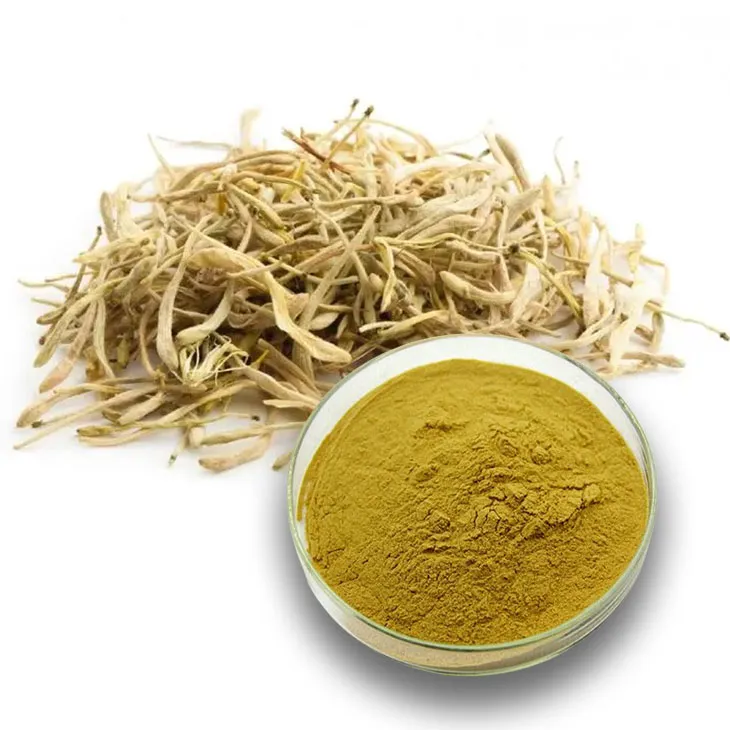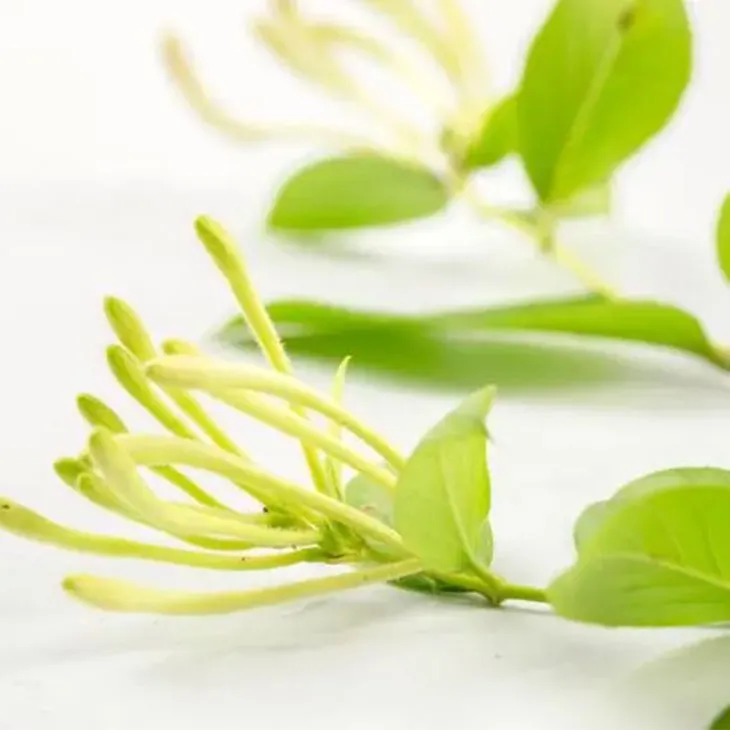- 0086-571-85302990
- sales@greenskybio.com
Honeysuckle pollen: Their production methods and the reasons for their popularity.
2024-12-20

1. Introduction
Honeysuckle, a beautiful and fragrant plant, has been known for centuries for its various properties. Among them, Honeysuckle Pollen has emerged as a remarkable product with a growing popularity. This article aims to explore in detail the production methods of Honeysuckle Pollen and the factors that contribute to its widespread acclaim.

2. Production Methods of Honeysuckle Pollen
2.1. Pollen Collection
Timing is crucial when it comes to collecting honeysuckle pollen. Honeysuckle plants typically bloom during a specific period, and beekeepers need to be vigilant during this time.
- Beekeepers first ensure that the honeysuckle plants are in full bloom. This is when the flowers are rich in pollen. They look for flowers with fully opened petals and visible stamens, which are the pollen - producing parts of the flower.
- Specialized pollen - collecting devices are used. These can be simple trays or more advanced apparatuses that are placed near the honeysuckle bushes. As bees visit the flowers to collect nectar, they also inadvertently pick up pollen on their bodies. When they move around the collecting devices, some of this pollen is rubbed off and collected.
2.2. Cleaning and Sorting
Once the pollen is collected, it needs to be cleaned and sorted.
- The collected pollen may contain debris such as bits of flower petals, small insects, or dust. It is first passed through a series of fine - meshed sieves to remove these larger impurities. This process helps in obtaining a relatively pure form of pollen.
- After sieving, the pollen may still have some unwanted substances. It is then gently washed with a mild, food - safe solution. This not only further cleans the pollen but also helps in removing any potential contaminants.
- Sorting is also an important step. Different types of honeysuckle may produce pollen with slightly different characteristics. The pollen is sorted based on factors such as color, texture, and size. This ensures that only high - quality, uniform pollen is retained for further processing or packaging.
2.3. Drying and Preservation
After cleaning and sorting, the honeysuckle pollen needs to be dried properly to ensure its long - term preservation.
- The pollen is spread out in a thin layer on a clean, dry surface. This can be a specially designed drying tray or a piece of clean parchment paper. It is then placed in a well - ventilated area away from direct sunlight. Natural air - drying is often preferred as it helps in retaining the natural properties of the pollen.
- The drying process may take several days to a week, depending on the ambient humidity and temperature. As the pollen dries, it loses moisture and becomes more stable. Once it has reached the appropriate dryness level, it is carefully packaged in airtight containers. These containers are usually made of materials that are impermeable to air and moisture, such as glass or high - quality plastic. This helps in preventing spoilage and maintaining the freshness of the pollen for an extended period.

3. Reasons for the Popularity of Honeysuckle Pollen
3.1. Health Benefits
Honeysuckle pollen is believed to offer several potential health benefits, which is a major reason for its popularity.
- Rich in Nutrients: Honeysuckle pollen is a natural source of various nutrients. It contains proteins, vitamins (such as vitamin C, vitamin E, and some B - vitamins), and minerals (including potassium, calcium, and magnesium). These nutrients are essential for maintaining good health. For example, the proteins in the pollen can help in building and repairing body tissues, while the vitamins and minerals play important roles in various physiological functions, such as maintaining a healthy immune system and promoting proper nerve function.
- Antioxidant Properties: The pollen is rich in antioxidants. Antioxidants are substances that help in protecting the body against oxidative stress. Oxidative stress occurs when there is an imbalance between free radicals (unstable molecules) and antioxidants in the body. Free radicals can damage cells and DNA, leading to various health problems, including aging, heart disease, and cancer. The antioxidants in honeysuckle pollen, such as flavonoids, can neutralize free radicals, reducing the risk of these diseases.
- Allergy Relief (Controversial): Some people claim that consuming honeysuckle pollen can help in relieving allergies. The theory behind this is that by consuming small amounts of local pollen (in this case, honeysuckle pollen), the body may gradually build up tolerance to it. However, this is a controversial topic, and more research is needed to confirm its effectiveness. Nevertheless, this claim has contributed to the popularity of honeysuckle pollen among some allergy sufferers.
3.2. Aroma and Flavor
The unique aroma and flavor of honeysuckle pollen also make it highly popular.
- Pleasant Aroma: Honeysuckle is known for its sweet and fragrant scent, and the pollen retains some of this characteristic aroma. When used in products such as candles, soaps, or potpourri, the honeysuckle pollen imparts a delightful and natural floral fragrance. This aroma is not only pleasant but also has a calming and relaxing effect on people, making it a popular choice for aromatherapy products.
- Subtle Flavor: In culinary applications, honeysuckle pollen has a subtle, sweet flavor. It can be used as a garnish in desserts, such as on top of cakes or ice creams, or added to teas to give a unique flavor. The delicate flavor of the pollen adds a touch of sophistication to food and beverages without overpowering the other ingredients.
3.3. Cosmetic and Skincare Applications
Honeysuckle pollen has found its way into the cosmetic and skincare industry, which has further increased its popularity.
- Moisturizing Properties: The pollen contains natural oils and lipids that can help in moisturizing the skin. When used in skincare products such as creams, lotions, or facial masks, it can penetrate the skin and lock in moisture, leaving the skin feeling soft and hydrated.
- Skin - Soothing Effects: Honeysuckle pollen has anti - inflammatory properties. It can be used to soothe irritated skin, reduce redness, and calm skin conditions such as eczema or psoriasis. Many natural skincare brands are incorporating honeysuckle pollen into their products to take advantage of these skin - soothing benefits.
- Anti - Aging Potential: Due to its antioxidant content, honeysuckle pollen may also have anti - aging potential. Antioxidants can help in preventing the breakdown of collagen and elastin in the skin, which are responsible for maintaining skin elasticity. By protecting these proteins, the pollen may help in reducing the appearance of wrinkles and fine lines.

4. Conclusion
In conclusion, honeysuckle pollen is a remarkable product with a unique set of production methods and a wide range of reasons for its popularity. From its meticulous production process, which involves careful collection, cleaning, sorting, drying, and preservation, to its numerous appealing qualities such as potential health benefits, pleasant aroma, and useful applications in cosmetics and skincare, honeysuckle pollen has carved out a niche for itself in various industries. As research continues to uncover more about this precious pollen, it is likely that its popularity will only continue to grow in the future.

FAQ:
What are the main production methods of honeysuckle pollen?
The production of honeysuckle pollen typically involves careful collection from honeysuckle flowers. Bees play a crucial role in this process. They visit the honeysuckle blossoms to gather nectar and, in the process, collect pollen on their bodies. This pollen can then be carefully harvested from beehives. In some cases, there may also be mechanical collection methods from large - scale honeysuckle plantings, but this needs to be done with great care to ensure the quality and purity of the pollen.
What are the potential health benefits of honeysuckle pollen?
Honeysuckle pollen is believed to have several potential health benefits. It may have antioxidant properties, which can help in fighting against free radicals in the body. Some studies suggest that it could have anti - inflammatory effects, potentially helping with various inflammatory conditions. Additionally, it might also contribute to boosting the immune system, helping the body to better defend against diseases.
How does the pleasant aroma of honeysuckle pollen contribute to its popularity?
The pleasant aroma of honeysuckle pollen is one of its appealing features. The sweet and floral scent is not only enjoyable but also gives a sense of freshness. It can be used in various products such as perfumes and scented candles to add a natural and appealing fragrance. In the context of food or herbal products, the pleasant aroma can enhance the overall sensory experience, making it more popular among consumers.
Is honeysuckle pollen used in any specific industries?
Yes, honeysuckle pollen is used in multiple industries. In the food industry, it can be used as an ingredient in some specialty foods or dietary supplements. In the cosmetic industry, as mentioned before, it is used in perfumes, lotions, and other products for its pleasant aroma and potential skin - friendly properties. It also has a place in the traditional medicine industry, where it is used for its potential health - promoting effects.
How is the quality of honeysuckle pollen ensured during production?
During the production of honeysuckle pollen, several measures are taken to ensure quality. For collection from beehives, proper beekeeping practices are essential, including maintaining clean and healthy hives. When it comes to mechanical collection, strict quality control procedures are in place. This includes careful sorting to remove any impurities such as plant debris or other foreign matter. Additionally, proper storage conditions, such as cool and dry environments, are maintained to preserve the quality of the pollen.
Related literature
- The Production and Properties of Honeysuckle Pollen: A Comprehensive Review"
- "Honeysuckle Pollen: Health Benefits and Industrial Applications"
- "Understanding the Aroma and Popularity of Honeysuckle Pollen"
- ▶ Hesperidin
- ▶ Citrus Bioflavonoids
- ▶ Plant Extract
- ▶ lycopene
- ▶ Diosmin
- ▶ Grape seed extract
- ▶ Sea buckthorn Juice Powder
- ▶ Fruit Juice Powder
- ▶ Hops Extract
- ▶ Artichoke Extract
- ▶ Mushroom extract
- ▶ Astaxanthin
- ▶ Green Tea Extract
- ▶ Curcumin
- ▶ Horse Chestnut Extract
- ▶ Other Product
- ▶ Boswellia Serrata Extract
- ▶ Resveratrol
- ▶ Marigold Extract
- ▶ Grape Leaf Extract
- ▶ New Product
- ▶ Aminolevulinic acid
- ▶ Cranberry Extract
- ▶ Red Yeast Rice
- ▶ Red Wine Extract
-
Curcuma Longa Extract/Turmeric extract
2024-12-20
-
Alfalfa Meal
2024-12-20
-
Camu Camu Extract
2024-12-20
-
Nettle Root Extract
2024-12-20
-
Wheat Germ Extract
2024-12-20
-
Curcuma Longa Extract
2024-12-20
-
Black Pepper Extract
2024-12-20
-
Lemon Extract
2024-12-20
-
Red Vine Extract
2024-12-20
-
Citrus Aurantii Extract
2024-12-20





















